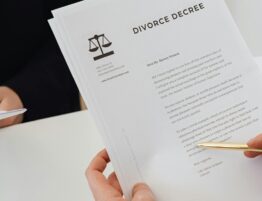Criminal Sentencing Hearings determine the length and conditions of a defendant’s sentence and is a point where the expertise of a skilled defense lawyer, such as those at the Law Office of Daniel Hutto, can make a impact on the outcome of a case.
During a sentencing hearing, the judge takes into consideration various factors, including the circumstances surrounding the crime, the defendant’s criminal history, and any mitigating or aggravating factors presented in the presentence report.
The defense lawyer’s role at this stage is to advocate for their client, presenting evidence and arguments that may influence the judge’s decision in favor of a more lenient sentence.
Here’s what this article will cover:
- How Does the Criminal Sentencing Process Work
- What Evidence Can Be Used in a Sentencing Hearing?
- Rights of the Accused During Sentencing
- Should I Take a Guilty Plea?
- Appealing a Sentence in Arizona
- Frequently Asked Questions
- How an Arizona Criminal Defense Attorney Can Help
How an Arizona Criminal Defense Attorney Can Help
Our Phoenix Criminal Defense Attorneys are Here to Help!

How Does the Criminal Sentencing Process Work
The criminal sentencing process in Arizona is an important phase in the criminal justice system, determining the punishment for individuals convicted of crimes.
This process is regulated by the Arizona Revised Statutes, ensuring that sentencing is just and consistent with state laws.
Conviction and Initiation of Sentencing Process
- Following Conviction: The process commences immediately after a defendant is convicted, either by a jury verdict or through a plea agreement.
- Sentencing Date: A separate sentencing hearing is typically scheduled shortly after the conviction, allowing time for the preparation of necessary reports and statements.
Pre-Sentencing Report
- Preparation by Probation Officer: A probation officer is assigned to prepare a comprehensive pre-sentencing report. This report is a crucial element as it provides the judge with detailed information about the defendant’s background and the nature of the offense.
- Content: The report includes information about the defendant’s prior criminal record, family and social history, mental and physical health, and any other factors relevant to the sentencing.
Sentencing Guidelines
- Statutory Framework: Arizona’s sentencing guidelines, found in Title 13 of the Arizona Revised Statutes, provide a framework for determining the range of possible sentences. These guidelines include mandatory minimum sentences for certain offenses, especially serious or violent crimes.
- Aggravating and Mitigating Circumstances: Judges consider both aggravating and mitigating factors that may increase or decrease the severity of the sentence. Aggravating factors could include prior convictions or the use of a deadly weapon, while mitigating factors might include the defendant’s lack of prior criminal history or cooperation with law enforcement.
Sentencing Hearing
- Presentation of Evidence: During the sentencing hearing, both the prosecution and defense have the opportunity to present evidence and arguments. This may include victim impact statements, testimony regarding the defendant’s character, and any mitigating circumstances.
- Judicial Discretion: The judge has discretion within the statutory guidelines to determine the appropriate sentence. The judge’s decision is influenced by the pre-sentencing report, the nature of the crime, the defendant’s criminal history, and any statements made during the hearing.
Post-Sentencing Considerations
- Appeals: Defendants have the right to appeal their sentence if they believe it was imposed in violation of the law or is manifestly unjust.
- Probation and Parole: In some cases, defendants may be eligible for probation or parole, which can significantly alter the nature of their sentence.
The criminal sentencing process in Arizona is designed to ensure that each sentence is fair and proportional to the offense committed, taking into account a wide range of factors about the offense and the offender.
What Evidence Can Be Used in a Sentencing Hearing?
In Arizona, the range of evidence that can be presented during a sentencing hearing is broad, encompassing various aspects of both the offense and the offender. Here’s a list of the types of evidence typically considered:
Criminal History
-
- Prior convictions.
- Previous arrests or charges, even if they did not result in convictions.
- Prior convictions.
Nature and Circumstances of the Offense
-
- Details about how the crime was committed.
- The severity and impact of the offense.
- Presence of any aggravating factors (e.g., use of a weapon, harm to minors).
Victim Impact Statements
-
- Testimonies from victims or their families.
- Description of the emotional, physical, and financial impact of the crime.
- Testimonies from victims or their families.
Mitigating Factors
-
- Evidence of the defendant’s mental health or psychological issues.
- Demonstrations of remorse or rehabilitation.
- Lack of a significant criminal history.
- Cooperation with law enforcement or authorities.
- Circumstances that may have influenced the defendant’s behavior (e.g., upbringing, coercion).
- Evidence of the defendant’s mental health or psychological issues.
Character Evidence
-
- Testimonies from family, friends, or employers about the defendant’s character.
- Evidence of good deeds or community involvement.
- Testimonies from family, friends, or employers about the defendant’s character.
Expert Testimony
-
- Psychological evaluations.
- Assessments by social workers or rehabilitation specialists.
- Psychological evaluations.
Demonstration of Rehabilitation Efforts
-
- Participation in treatment programs (e.g., substance abuse, anger management).
- Efforts to make amends or restitution.
- Participation in treatment programs (e.g., substance abuse, anger management).
The evidence presented in a sentencing hearing plays an important role in shaping the judge’s decision.
Rights of the Accused During Sentencing
In Arizona, the accused have rights that safeguard their best interests during sentencing. This includes the right to legal representation, either through a criminal attorney or a defense attorney experienced in such cases. They can present evidence and witnesses, advocating for factors that may positively influence the sentencing outcome.
The accused also have the right to personally address the court, a process known as allocution.
The court must consider these submissions before finalizing the sentencing decision. Ensuring a fair and impartial hearing.
Should I Take a Guilty Plea?
A plea deal, also known as a plea bargain, is an agreement in the criminal justice system where a defendant agrees to plead guilty to a lesser charge or to one of multiple charges in exchange for a more lenient sentence or the dismissal of other charges.
In Arizona, plea deals are typically offered and negotiated before a case goes to trial, but they can also occur at any point in the legal process, often before the sentencing phase.
Pros of Taking a Guilty Plea:
- Reduced Sentence: Often results in a lighter sentence than if found guilty at trial.
- Quick Resolution: Avoids the length and uncertainty of a trial.
- Less Publicity: Typically involves less media and public exposure.
- Potential for Plea Bargain: Opportunity to negotiate for lesser charges or penalties.
- Certainty: Provides a definite outcome rather than the unpredictability of a jury decision.
Cons of Taking a Guilty Plea:
- Criminal Record: Results in a criminal conviction that can impact future opportunities.
- Waiver of Rights: Forgoes the right to a trial and to contest the charges.
- Possible Incarceration: Depending on the plea deal, may still involve jail time or other penalties.
- Impact on Reputation: Guilty plea may adversely affect personal and professional reputation.
- Limited Appeal Options: Reduces the grounds on which an appeal can be made.
In summary, a guilty plea can offer a quicker, potentially more lenient resolution but comes with the trade-off of a guaranteed criminal record and other potential long-term consequences.
Appealing a Sentence in Arizona:
In Arizona, the process of appealing a sentence is a legal right for individuals convicted of a crime. Once a sentence is pronounced, the defendant can challenge the decision if there are grounds to believe that legal errors affected the outcome.
This includes questioning the appropriateness of the sentence based on the facts of the case, the application of law, or procedural issues. The appeal must be filed within a specific timeframe post-conviction, and it is typically reviewed by an appellate court.
Frequently Asked Questions
- What factors does the judge consider during sentencing hearings in Arizona? The judge considers multiple factors including the severity of the offense, the defendant’s criminal history, any aggravating or mitigating circumstances, and the impact on victims. These factors help determine the appropriate sentencing range.
- How can a defendant’s character impact the sentencing decision in Phoenix? A defendant’s character, including past behavior, community ties, and reputation, can influence the court’s decision, especially in mitigating the sentence if it portrays the defendant in a positive light.
- In Arizona, what role do defense and the prosecutor play in the pre-sentencing phase? Both parties present evidence and arguments to influence the sentencing decision. The defense typically highlights mitigating factors, while the prosecution may emphasize aggravating aspects to justify a harsher sentence.
- What are the due process rights of a defendant during a jury trial in Arizona? These rights include the presumption of innocence, the right to confront witnesses, the right to present evidence, and the right to a fair and impartial trial.
- How does a presentencing report influence sentencing hearings in Arizona? The presentencing report provides the judge with detailed information about the defendant’s background and the crime, which is crucial in determining an appropriate sentence.
- Can evidence including hearsay be used in Arizona sentencing hearings? Yes, the rules for admissible evidence are less strict in sentencing hearings, and hearsay can sometimes be considered, especially in the context of victim impact statements.
- What is the statutory range for non-dangerous offenses in Arizona? The statutory range for non-dangerous offenses varies depending on the specific crime but generally involves less severe penalties than dangerous offenses.
- What does it mean when a judge has the discretion to impose the maximum sentence in Arizona? It means the judge can decide to impose the harshest sentence allowed under law, usually in cases with significant aggravating factors or a severe offense.
- In what cases might a defendant go straight to sentencing without a trial? This usually happens in cases involving minor misdemeanors or when the defendant enters a guilty plea, bypassing the need for a trial.
- How can an experienced criminal defense attorney affect the outcome of a sentencing phase in Arizona? An experienced attorney can effectively present mitigating evidence, negotiate plea deals, and advocate for the defendant’s interests, potentially leading to a more favorable sentencing outcome.
How an Arizona Criminal Defense Attorney Can Help

An experienced and aggressive criminal defense attorney in Arizona, like those at the Law Office of Daniel Hutto, helps guide defendants through the complexities of the criminal justice system.
These attorneys bring their expertise to every aspect of a case, from examining the evidence and identifying key legal issues to representing clients in court. Ensuring their clients’ rights are protected at every stage, especially during phases like plea negotiations and sentencing hearings.
Their legal knowledge and commitment to client advocacy position them to effectively handle a wide array of criminal charges, providing support to defendants throughout the challenging journey of a criminal case and the criminal sentencing process.
To schedule a free initial consultation with the Law Office of Daniel Hutto, you can contact them at 602) 536-7878












